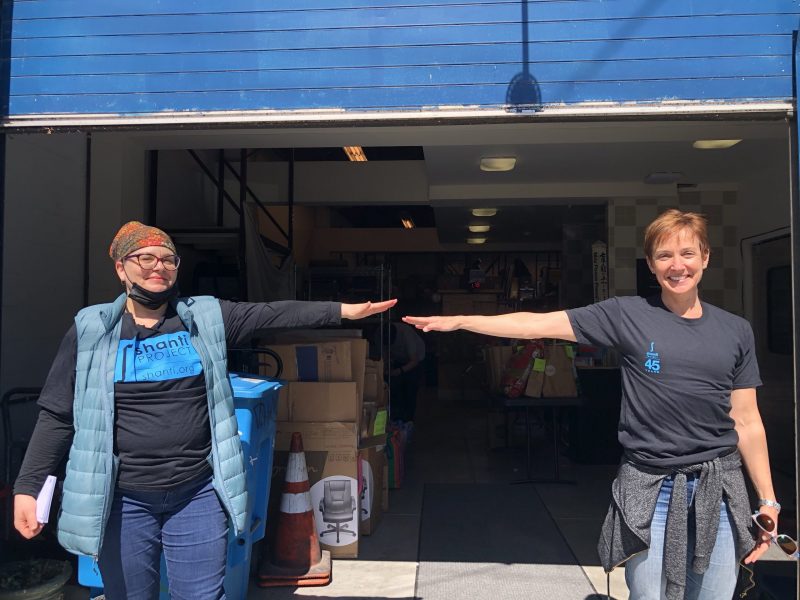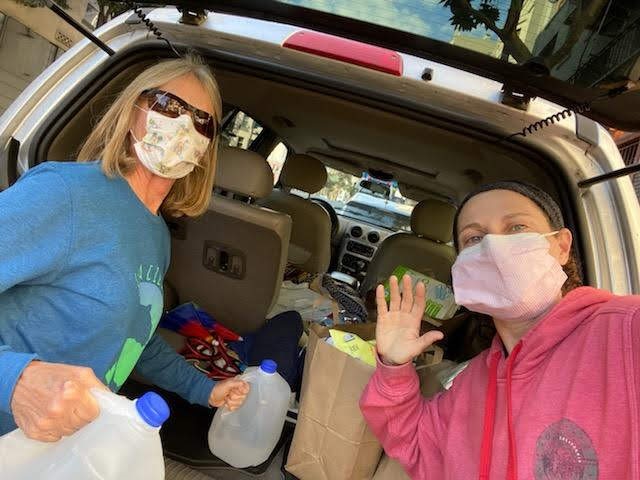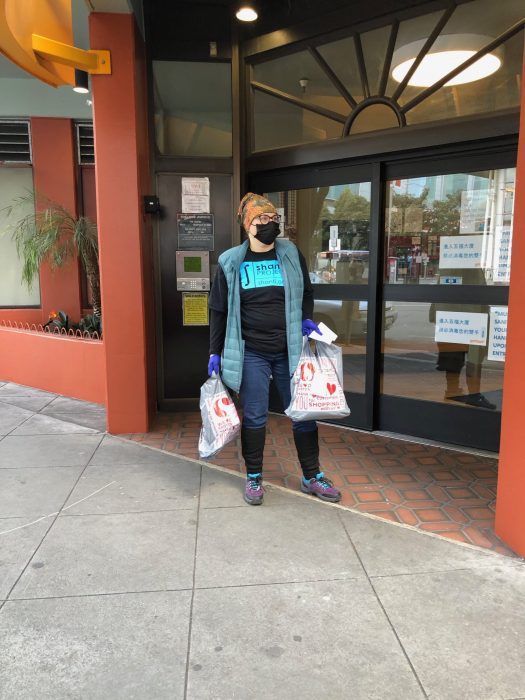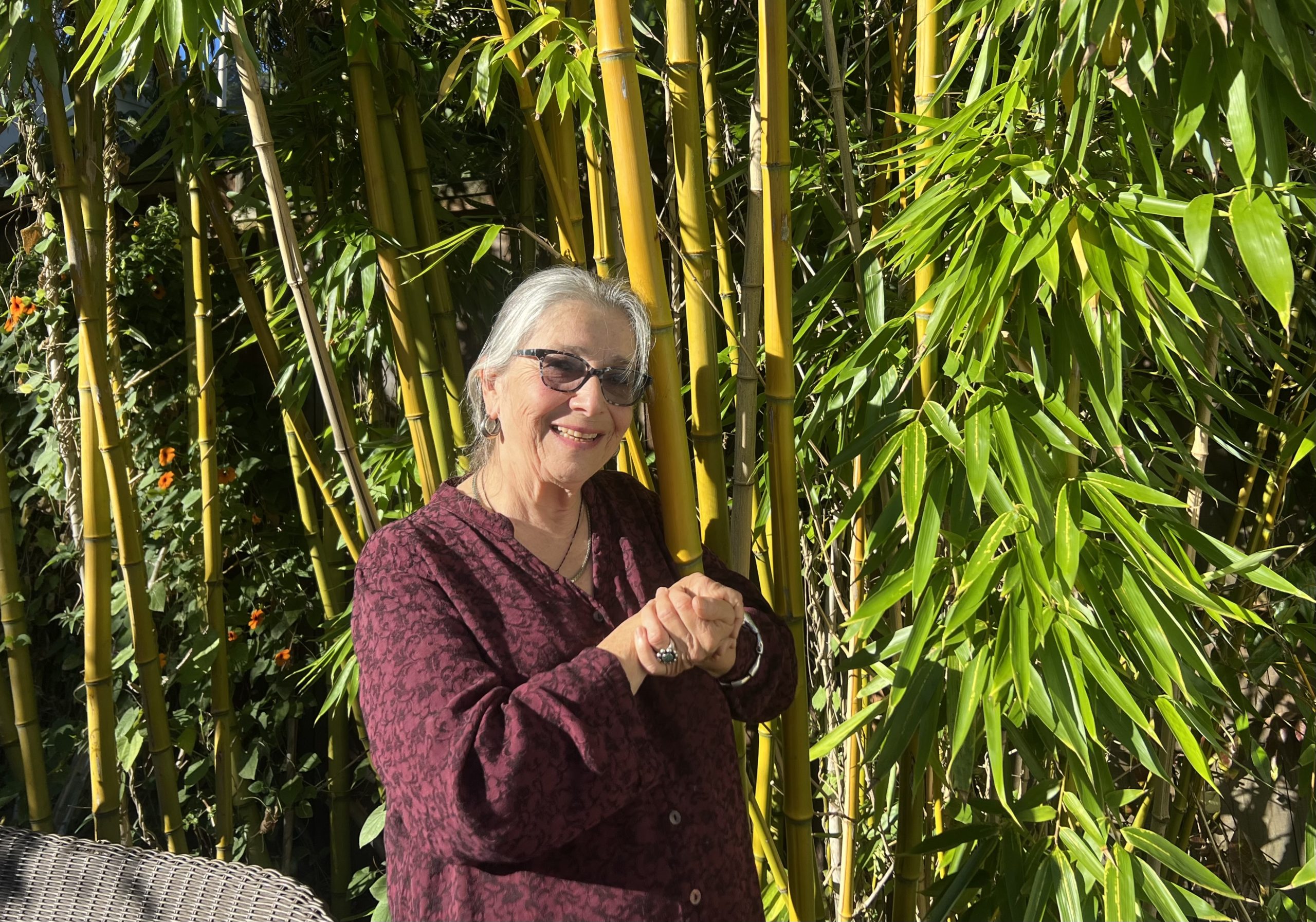Coping with Covid-19: Shanti Project partners with city agency in new program to help the most vulnerable
The Shanti Project, created in 1974 to support people with life-threatening illnesses, has launched a new project to address the coronavirus pandemic, in partnership with San Francisco’s Department of Disability and Aging Services (DAS).
The CERV (COVID-19 Emergency Response Volunteer) program provides one-time or occasional practical support to older and vulnerable adults, who are strongly advised to limit their outdoor exposure. This may be grocery shopping, dog walking, delivery of pet food, medication and other essentials, and mail pickup.

Founded at the UCSF Cancer Institute, Shanti was one of the first volunteer organizations in the United States to make sure no one with a life-threatening illness had to go through it alone. In the 1980s, it was one of the world’s first community-based organizations to help support people with HIV/AIDS.
The Shanti Project went on to add programs for women facing cancer, LGBTQ persons with aging or disability issues as well as partnering with PAWS (Pets Are Wonderful Support), to provide for family animals during a health crisis. In addition to CERV, Shanti is working to support public housing tenants as the Potrero View projects are demolished and rebuilt.
We talked with Shanti officials about CERV as well as its other programs.

Have you been able to continue helping all your clients so far?
As an organization dedicated to reducing isolation and improving quality-of-life outcomes, the pandemic, coupled with pervasive isolation, has compounded the hardships many of our community members.
Have you had to change operations under Shelter-in-Place and social distancing orders?
We’ve moved most of our staff to working remotely. We are still able to provide a number of our essential services over the phone or by email. For our services that still require in-person interaction, we’ve established protocol to follow, including: the use of personal protective equipment; when possible, contactless delivery of groceries, medication and documents, and social distancing.
People who provide in-person services are wearing gloves and masks. When needed, we are able to provide them for staff and volunteers, although many are able to supply their own PPE, particularly masks. They are not necessarily N95 masks, as those are in short supply.
What’s been the biggest impact of these orders?
We had to quickly adapt our way of working with one another and with our clients while expanding services to address the extra support needed by the city’s most marginalized and most vulnerable right now. In addition to the CERV program, we have also expanded our pet food deliveries to our most at-risk clients, partnered with Full Belly Bus to provide free pet food to marginally housed residents and took the lead on the coronavirus response for residents living in Potrero Annex public housing, and more.
We are accepting new clients in all programs except our PAWS (Pets are Wonderful) support program. Its waitlist is closed, but current clients are still being served.

How are staff members coping?
Luckily, none have been diagnosed with Covid-19. Staff spirits are high. The physical and emotional wellbeing of our employees is a priority and a frequent topic of discussion among our leadership team. We have increased the number of check-ins between supervisors and their direct reports.
And there have been a number of creative solutions to engage employees using technology, such as a virtual company water cooler, adoption of video conferencing and using team chats. We’re currently planning an all-staff event through video conference.
Clients have been understanding and resilient. Some care navigators are hosting group activities through video conference; they said the virtual group meetings have been successful and enjoyed by clients.
Are you facing shortages of staff? If so, are you hiring and what positions?
We are not facing shortages of staff. We are hiring for open positions, which are available despite the pandemic.
Are you facing shortages of any supplies? If so how are you addressing that? Is there anything the public can donate?
We are always in need of pet food for our PAWS food bank.
Do you see any way in which this pandemic may change your operations overall in the future?
Yes. So much of our work before the pandemic was face-to-face: staff meetings, one-on-one client meetings, one-on-one volunteer meetings, client group activities and the occasional larger gatherings for staff, clients, and supporters and volunteers.
We are planning what the future of work will look like for us—where we will continue to adapt our services and how we will safely phase back staff to working onsite, such as limiting the amount of traffic in the office, establishing protocols, ensuring adequate distancing can be achieved, adapting the way we interact onsite, and remaining flexible.
Has or will this pandemic have any effect on your funding?
We did have to cancel our annual canine-friendly fundraising gala for PAWS,”Petchitecture.” It is too early to tell, but the Board of Directors has created a $150,000 challenge grant for the community. The board will match all donations made now through June 30, 2020, up to a total of $150,000.
What some of the Shanti volunteers have to say:
“Doing a simple task like grocery shopping has changed in recent weeks. There may be 20 people lined up outside a grocery store; there might be 50. For us to stand in line in cold, blustery rains or on a hot day is no big deal. But it also gives us an appreciation of what our older and ill people have to deal with.”
Jenna Slovis
“I’m a PAWS volunteer of 20 years. Every dog walked, holiday stocking delivered, vet office visited and kitty fostered brings immense joy. By profession, I’m a conference planner. Our worldwide public health crisis has temporarily stymied my industry. This means I have more time. Knowing our communities have older, vulnerable and disabled individuals who might find this time more challenging than most, my partner and I reached out to PAWS. My partner is also a longtime PAWS vol. We learned Shanti and PAWS were working on a program to meet emergency needs during the pandemic. We’re healthy and able and were oh-so happy to sign up to help.”
Ingrid Kreis
“I lost my job due to the COVID-19 related shutdowns in San Francisco, and while at first that was very dispiriting, it helped me realized how privileged a position it is to have my health, and it made me want to use some of my newfound free time aiding vulnerable people. Volunteering through CERV has made me feel less helpless.”
Logan Hansen





